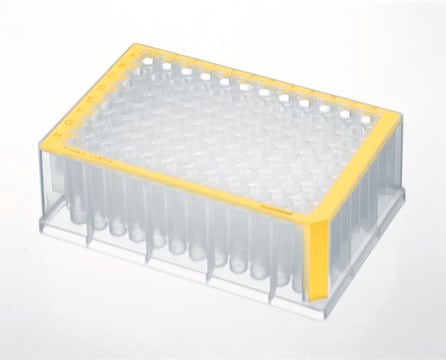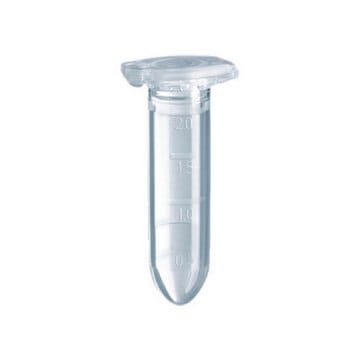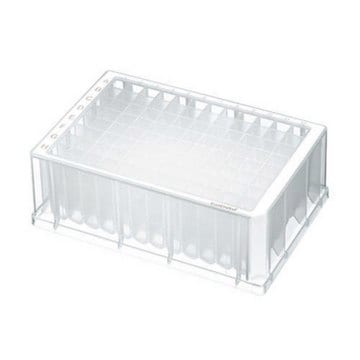EP951033308
Eppendorf® Deepwell plates, Protein LoBind, 96 wells
white plate, conical bottom, colorless wells, capacity 500 μL, pkg of 80 ea (10 bags × 8 plates)
Sign Into View Organizational & Contract Pricing
All Photos(1)
About This Item
UNSPSC Code:
41106300
Recommended Products
material
clear wells
colorless wells
conical bottom
polypropylene
white plate
sterility
non-sterile
feature
lid: no
packaging
pkg of 80 ea (10 bags × 8 plates)
manufacturer/tradename
Eppendorf® 951033308
capacity
500 μL
well volume
1000 μL
color
white border
suitability
suitable for (protein analysis)
suitable for PCR
binding type
low binding surface
Looking for similar products? Visit Product Comparison Guide
Related Categories
General description
Deepwell Plate 96/1000 µL, Protein LoBind], wells colorless, 1,000 µL, PCR clean, white, 80 plates (10 bags × 8 plates)
- Eppendorf LoBind material ensures excellent sample recovery for improved assay results
- Free of surface coating (e.g., silicone) to minimize the risk of sample interference
- Lot-certified PCR clean purity grade: free of human DNA, DNase, RNase and PCR inhibitors
- Available in tube, microplate, and deepwell plate formats for easy-up scaling
- Unique OptiTrack® matrix: 30 % faster sample identification and fewer pipetting errors
- RecoverMax well design: optimized well geometry for minimal remaining/dead volume and excellent mixing properties
- Raised well rims and a smooth surface ensure reliable sealing in plates
Features and Benefits
- Eppendorf LoBind material ensures optimized sample recovery for improved assay results
- Free of surface coating (e.g. silicone) to minimize the risk of sample interference
- Lot-certified PCR clean purity grade: free of human DNA, DNase, RNase and PCR inhibitors
- Available in tube, microplate, and deepwell plate formats for easy-up scaling
- High-contrast Unique OptiTrack® matrix: up to 30 % faster sample identification and fewer pipetting errors
- RecoverMax® well design: optimized well geometry for minimal remaining/dead volume and excellent mixing properties
- Raised well rims and a smooth surface ensure reliable sealing
Legal Information
Eppendorf is a registered trademark of Eppendorf AG
OptiTrack is a registered trademark of Eppendorf AG
RecoverMax is a registered trademark of Eppendorf AG
Certificates of Analysis (COA)
Search for Certificates of Analysis (COA) by entering the products Lot/Batch Number. Lot and Batch Numbers can be found on a product’s label following the words ‘Lot’ or ‘Batch’.
Already Own This Product?
Find documentation for the products that you have recently purchased in the Document Library.
Kelly Hodge et al.
Journal of proteomics, 88, 92-103 (2013-03-19)
Mass spectrometry, in the past five years, has increased in speed, accuracy and use. With the ability of the mass spectrometers to identify increasing numbers of proteins the identification of undesirable peptides (those not from the protein sample) has also
Hongchang Qu et al.
Immunobiology, 218(4), 496-505 (2012-07-17)
Therapeutic modulation of the complement system has become increasingly important in line with the growing recognition of the role of complement in numerous diseases. Compstatin, a peptidic inhibitor that acts at the central level of the complement cascade, is currently
Byung-Gyu Kim et al.
Proteomics, 6(4), 1166-1174 (2006-01-20)
Runx2 is a key transcription factor in osteoblast differentiation, and its activity is regulated by fibroblast growth factors (FGFs). Craniosynostosis, characterized by premature suture closure, results from mutations that generate constitutively active FGF receptors (FGFRs). We previously showed that FGF/FGFR-activated
Arzu Umar et al.
Proteomics, 5(10), 2680-2688 (2005-05-14)
Appropriate methods for the analysis of microdissected solid tumour tissues by matrix-assisted laser desorption/ionisation-time of flight-mass spectrometry (MALDI-TOF MS) are not yet well established. Optimisation of sample preparation was performed first on undissected tissue slices, representing approximately 200 000 cells
Graziano Colombo et al.
Free radical biology & medicine, 52(9), 1584-1596 (2012-03-06)
Cigarette smoke, a complex mixture of over 7000 chemicals, contains many components capable of eliciting oxidative stress, which may induce smoking-related disorders, including oral cavity diseases. In this study, we investigated the effects of whole (mainstream) cigarette smoke on human
Our team of scientists has experience in all areas of research including Life Science, Material Science, Chemical Synthesis, Chromatography, Analytical and many others.
Contact Technical Service






